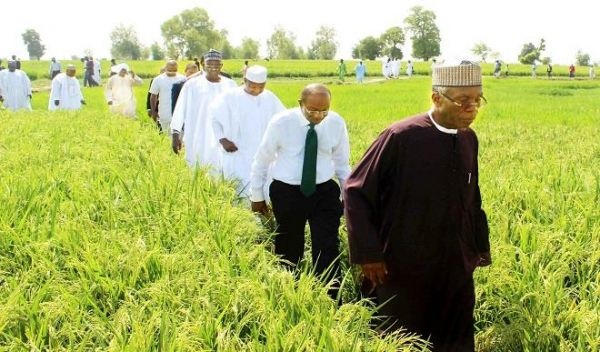A report released weekend by the Business Hilights Intelligence Unit (BHIU), on the status of Nigeria’s ongoing back-to-the-land scheme on rice production, has revealed three environmental factors crippling the rice backward integration drive of the federal government.
These include “Recent spate of virus attack across all major rice farms in the country suspected to have been sent by farmers from world rice producing nations whom Nigeria had been their key markets”.
“Other two environmental factors are momentary attacks by herdsmen and the most recent flooding experience in about 12 states of the federation.
“BHIU received with shocks the recent outburst of the revelation of Reformed-All Progressive Congress (R-APC), Engr Buba Galadima, who revealed that a yet to be studied virus invaded leading rice states recently and attacked farms, thus putting expected high yield this year in danger.
“We are aware that the Central Bank of Nigeria (CBN) Anchor Borrower Programme (ABP) powering rice revolution had performed creditably well before the virus and herdsmen two-ways attacks that frustrated their expected harvest boom which is now forcing ABP loan beneficiaries to not only default but disappear without paying back their loans.
According to Mr. Chido Nwakanma, he said “An examination of the various claims of the federal government on this rice matter is very instructive. Buhari claims that under his leadership the Federal Government has so performed on the agriculture sector that rice imports are now down up to 90 per cent”.
“The evidence of our eyes says otherwise. The rice stalls in our markets point to the dominance of imported rice by the same 90 per cent that Mr President cites. The data also says otherwise. In making this claim, PMB cites Agriculture Minister Audu Ogbeh. One can imagine the minister’s embarrassment. Earlier this year, Minister Ogbeh claimed that rice imports had so declined because of this so-called back-to-the-land scheme that rice mills in Thailand were closing. He even cited the ambassador of that country.
“It was a big fat lie, as records would show. The Thais rebutted to show that no rice mill in their country closed down. Other records showed increased export of Thai rice to our neighbours Benin Republic and Cameroun. The Thais and their Nigerian importers were using the encirclement strategy to get the rice to Nigeria.
“More importantly, the North is supposed to be the place where this agricultural revolution has happened the most. On March 24, 2018, a meeting of 16 Northern political groups put the lie to this claim.
“In their communique, they stated, “Agriculture shows limited glimpses of recovery, but almost entirely through efforts of peasants and antiquated processes. The North is completely de-industrialized, while the rest of the nation moves towards sustainable growth and development. There is no evidence of bold thinking, strong political will and/or serious concern by any leadership at any level to reverse the alarming decline of the Northern economy.” In other words, the government had not done anything to move agriculture forward one jot.
Explaining more on the recent virus attacks especially on the occurrence, istribution and characterization of Rice Yellow Mottle Virus (RYMV) attacks, a combined analysts by leading scholars and researchers including R.O. Onasanya, D.B. Olufolaji, A. Onasanya, Y. Sere, F.E. Nwilene, M. Wopereis and P. Kiepe, made it clear that “RYMV genus Sobemovirus is a highly variable pathogen that is very infectious to rice plant”.
According to them, “This variability hinders rice breeding for durable resistance to the virus and effective deployment of improved cultivars in Southwest Nigeria. Disease surveys in 5 Southwest states (Lagos, Oyo, Ogun, Ekiti and Ondo) revealed RYMV disease incidence of between 15-70% in farmers’ fields and serological indexing confirmed 92% of collected leaf samples positive to RYMV with 24% from rice and 76% from weeds.
“The weed with 76% RYMV positive suggests being the main reservoir of RYMV in Southwest Nigeria. Biological test on collected fields leaf samples identified 3 groups (GroupA, GroupD and GroupE) of Resistance Breaking (RB) RYMV isolates and 2 groups (GroupB and GroupC) of normal isolates. Pathotyping 20 RYMV isolates against 10 differential varieties identified 17 isolates as Highly Pathogenic Isolates (HPI) and 3 as Mildly Pathogenic Isolates (MPI) while 4 rice varieties were Highly Resistant (HR), 2 were Moderately Resistant (MR) and 4 were susceptible.
“HPI isolates present in five states and MPI isolates in two states. Serological study using the same 20 RYMV isolates revealed two major Nigeria serogroup (NSg1 and NSg2) and four subgroups (NSg1a, NSg1b, NSg2a and NSg2b). NSg1a and NSg1b comprised both normal and RB isolates while NSg2a and NSg2b were typical of RB isolates only.
The experts agreed that “This information would assist rice breeding programs to develop durable resistant cultivars to RYMV disease in Southwest and other parts of the country where the attacks are prevalent.









